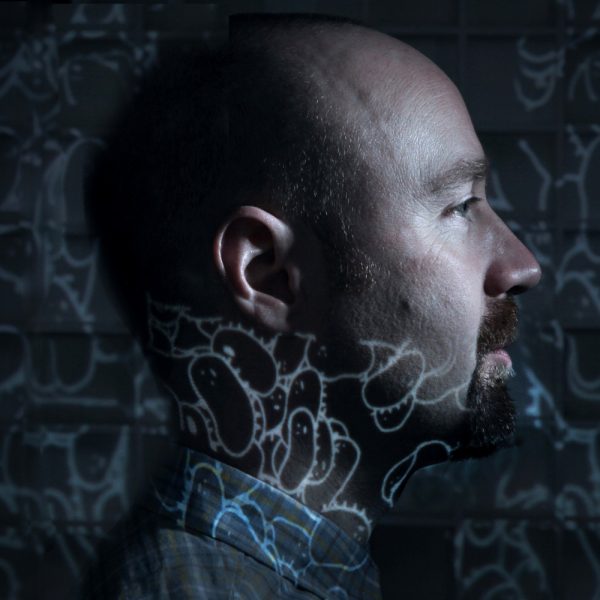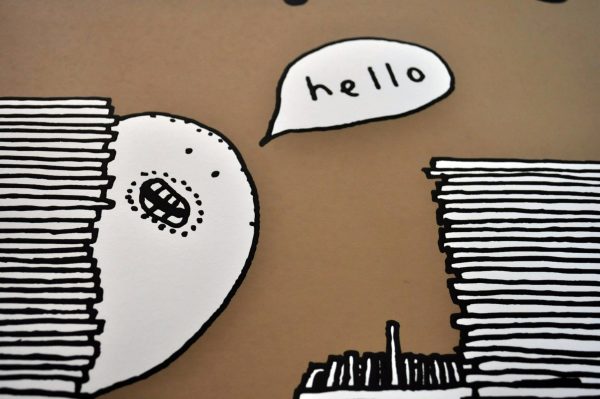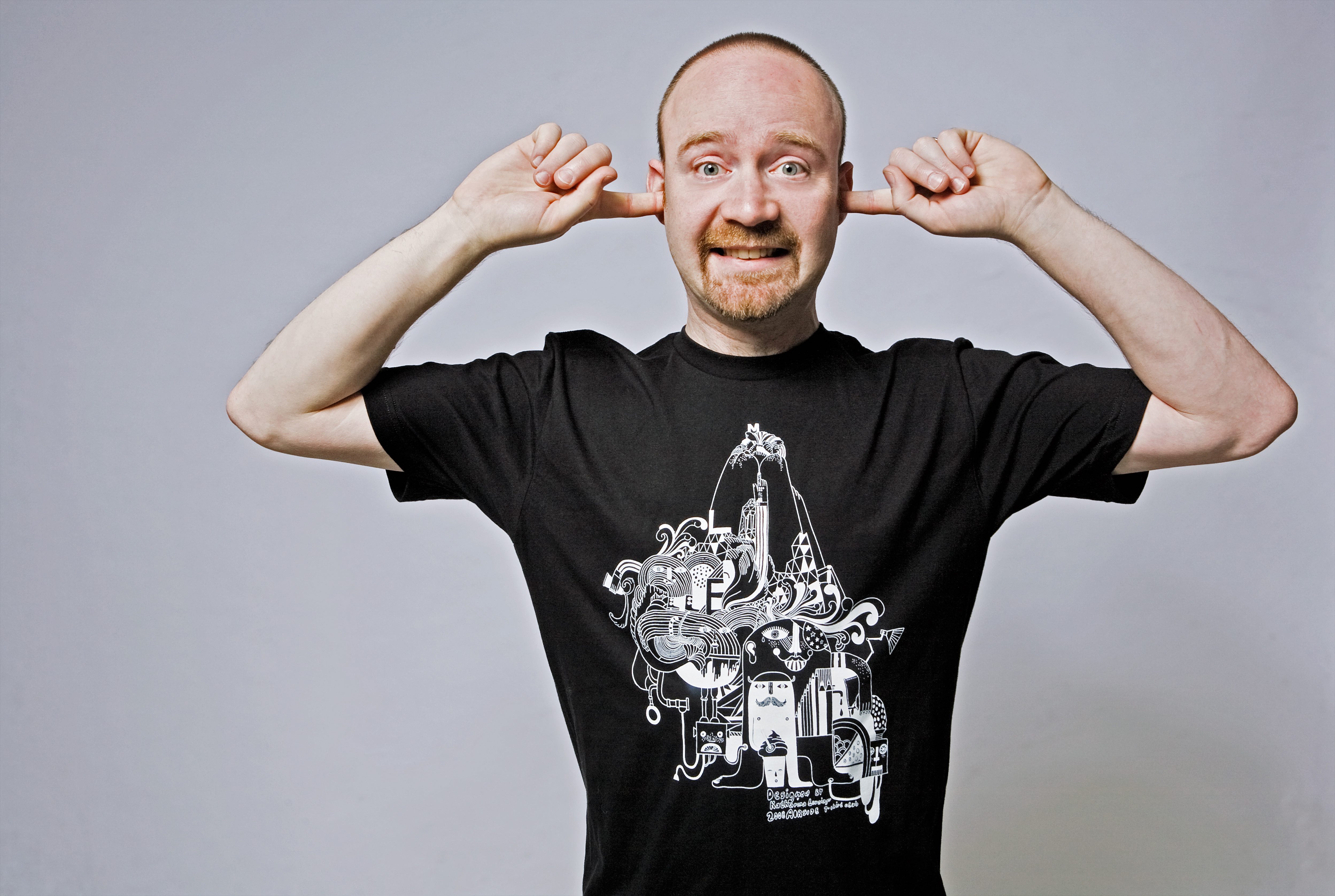In 1999 an album hit the shelves that would etch a name in the electronic music history books eternally. The album was called “Keep it Unreal”, an album that became revered for it’s quirky idiosyncrasies, but also for its incredible level of artistry. As musical genres converged and common tropes exorcised from their banality through the course of its narrative, it established a new musical landscape. It would cement it and its creator into the electronic music annals and go some way in traversing that great divide between the accessible and the progressive.
It was an album that certainly caught the zeitgeist of the era where acts like The Avalanches and DJ Shadow were revered for their cut-and-paste diatribe style of music making and like “Since I Left You” or “Entroducing…”, “Keep it Unreal” has stood the test of time.
Keep it Unreal was Andrew Carthy’s second only album as Mr. Scruff, but it solidified the artist’s style and sound as a collage of various musical traditions, channeled through a singular artistic voice. Combining elements of Jazz, House, Hip Hop and just about any sample he could lay his hands on, Carthy harnessed the full potential of electronic music and its various origins to create one of the most endearing albums on the Ninja Tune catalogue. It combined Carthy’s very English pythonic sense of humour with a very considered musical effort, harnessing the eclectic musical approach from his early experiences through the radio.
It was the radio that laid the foundation for a career in DJing and production when Carthy, raised in Manchester, heard the likes of John Peel, Stu Allen and Greg Wilson through stations like Piccadilly, Radio Lancashire & Southside. When a friend played Carthy an uncle’s electro records at a pubescent age, Carthy was hooked and a pair of tape decks would lead to a rudimentary introduction to DJing. With no education other than his favourite jocks on radio, Carthy’s career took him from the bedroom to his first gig in Manchester and almost concurrently his first 12” release.
Carthy’s approach to music has always been a “consistent with different results” he says over a telephone call early one Monday morning while dealing with the admin activities of the week and since making his first mark as a DJ and producer, he’s been on a path all his own. Carving out a career of those early influences and adapting through the different eras, Mr. Scruff’s five albums and countless EP’s are distinct and prominent features in electronic music history.
He carries that individuality through to his incredible DJ sets, and his Keep it Unreal residency in Manchester has been going strong since 1999. He often packs up his show to bring it on the road, and his next stop is Jæger’s where he brings his special brand of humour and expertise to our basement for a night with Mr. Scruff. We were curious to find out more about this and what exactly defines his artistic personality, and in the context of the show looming ever closer, we called the DJ and producer for a Q&A session. As expected from an intellectual talent like Carthy’s, and as we were already quite familiar with his extensive bio, our conversation took us to some very abstract ideas about music as we discussed what restrictions defined his artisic drive and to what end his music and DJ sets operate.
Hello Andy, where are you at the moment and what are you up to?
I’m just getting some exercise after dropping my daughter off at school. I’m spending the day doing admin stuff, getting all the jobs that I don’t really want to do out of the way. (laughs)
Have you been playing abroad a lot lately?
Yeah, I had a heavy summer. I usually have one heavy month followed by a quiet month. It’s all about finding a balance at the moment, so you never feel like you’re doing too much.
And you’re still doing the unreal nights at band on the wall?
Yes, we’ve been doing it monthly since we started in 1999. It’s still going very strong. I think it’s important to have a good residency, it gives you a sense of purpose and focus.
What is that purpose and focus?
A residency stops you repeating yourself, because if you play the same venue every month you’ve got to keep pushing forward. I’ve had many residencies over the course of my career so having a residency is something I’m very comfortable with.
I’m always trying new things, playing music I’ve never played before, taking risks. If you know system, you know the crowd, you know the acoustics and you’re in familiar surroundings, it’s the perfect environment for a DJ to try new things. I’ve put in a lot of work to make sure I’m comfortable and when I’m relaxed, I experiment.
Can you have that same level of comfort when you’re playing abroad in unfamiliar places?
I try to repeat that everywhere I go, yes. I rely on my experiences and always have a few hours before to set up. I think Jæger is coming from the same level I do, like Sub Club in Glasgow and Plastic People when that was open. You know it’s been set-up from an obsessive perspective of playing records. I’ll move speakers around and gain access to the processors to and make any improvements wherever necessary, but ultimately I enjoy playing different venues.

So when you play at a place like Jæger is it like an extension of it keep it unreal nights?
The attitude with my residency is that I take it everywhere I go. You should be yourself as much as possible wherever you play, while at the same time adapting to the theme. Like if I play a Soul and Reggae night, I will cater to that night and sometimes I enjoy doing a specialist night too.
You adapt and decide what you’re doing as you get on. How you feel, how the room makes you feel and how people behave; all play a role in how the night unfolds so you’re not really thinking about residencies, you are thinking about that night at that moment.
That’s why I like warming up for myself; that’s how you get to know the crowd you see individual people coming in. It’s important for every DJ to get to that peak where everybody feels satisfied, and it’s just about getting to those peaks. You’ve gotta come away from that night, thinking, yeah I played some records I didn’t think I’d get away with.
I know you insist on playing longer sets wherever possible, and that was the acceptable norm when you started out. So how do you feel in this era where shorter, festival/boiler-room sets have become the accepted norm?
I think you are going to adapt to what you do. Club DJing has almost become like a DMC showcase – tight and quite prepared. When you only have an hour on the festival stage, you are at least going to have a half a set planned and the shorter you are going to play, the less risks you are going to take. I’m very careful about being critical however, that’s the attitude of people that are frightened of change and think everything was better in their time.
When you’ve got a specific sound, doing short sets can be quite cohesive as long as everybody is listening to each other. It’s a long way of going back to back at the end of the day and I like playing two or three records each with someone all night and seeing where that takes you. How sensitive you are as a selector and making sure you do what’s right for that time, is what will set you apart.
One of the negative things of playing short sets, is that generally the least experienced DJ will be on earliest, and they’d be most eager to please, so that’s when you get peak time music at ten o’clock, which doesn’t work for anybody.
All I can say is that I prefer to play longer, because I’m old and that’s how I learned to DJ. I play most of a tune, and If I like a tune I’ll play all of it. I spend a lot of time looking for obscure music and trying to play music that’s not being played a lot. In older music with lots of dynamic shifts, the structure of the record can help you move around in terms of style and energy and tempo. So I’d like them to hear the whole tune and I like to let music breathe, and dictate the course of a night.
That reminds me of something you once said in an interview. You mentioned that the only criteria for a record to make it in a set is for it to have soul. If I could press you to put that in more pragmatic terms, how would you explain that?
Content over style. It has to be an honest document of what the person or the band were feeling at the time. It should be raw, not just sonically and it could be hard brutal Techno or just a Soul ballad. It always speaks to me in a clear quiet way, then I can put that person’s vision in amongst other people’s musical works, and make something that’s cohesive.
You’ve also mentioned in the past that an album should be like a DJ set. How do you capture that soul in the studio?
In the studio that means capturing those moments and mistakes. It’s not about proving how good you are technically, but rather about capturing the spirit of what got you excited in the first place. If it means capturing the first take with a few mistakes, then that’s what it’s supposed to be about for me. When I record other musicians, I don’t let them know what the idea is, and I just press record. Hearing them go from not being sure to completely confident, that little change in attitude, I find that’s a beautiful thing.
From there, the music tells you what to do with it, whether that’s in the studio, or a record in a DJ set. You need to keep things free and push yourself. In the booth I’m just gonna let the music tell me how to make the transition into the next song. When you’re playing so many genres together you have to go on the history of the music, but you also have the history of the presentation of how that music lives in its original culture. The music I play has very common roots with subtle differences and once you start learning all these connections, it makes it easier to hop between them in a very natural way.
It’s my job to get people excited, touch different sections of the crowd at different times of the night. There’s all these different elements you try to juggle at once. The records have to fit together like a jigsaw, but that jigsaw isn’t rectangular.
You touched there on that eclecticism in your sets and I’ve often heard you talk about your early influences and especially radio’s influence. Is that eclecticism a result of those early influences?
Yes, John Peel was very influential, but I’ve been into all different kinds of music since the eighties. It’s taking the freewheeling aspect of a radio DJ, but applying a very technical DJ approach to it.
And how does that apply to your creative work in the studio too?
I’ve been a heavy (record) collector across different genres, so in the studio it’s about letting a sample dictate the track. For me to be stylistically restricted in the studio I find quite frustrating.
… It’s always strange talking about something that you’ve been doing in a very natural and intuitive way for many years. You end up running out of words.
I am very familiar with that conundrum of course, I mean how do you take some ineffable and abstract thing like music and put it into words.
Yes exactly.
An aspect of your music that’s perhaps a bit more literal is that famous English sense of humour that is often found on your records. Where does this come from and what do you think it brings out in the music?
It’s just part of who I am. I might be quite silly sometimes and that comes out in a very particular way. It’s about making combinations that might just make you smile. Music is about socialising and I love hearing the sound of a band having a great time in the studio. By doing that you are passing on a good energy to the audience.
With recording you establish a context and create some kind of twisted meaning which creates the humour, and that kind of friction between the words and the music keeps people engaged. It’s always a happy accident.
Is that also the function of the artwork, which is so central to your work and yet another aspect of your artistic personality?
When I started putting records out I just happened to design the sleeves. The silly cartoons seemed to work really well and that humour in the music comes out very much in my cartoons. It helps to keep quite a light hearted atmosphere at the gigs too. It’s about not taking yourself too seriously and creating relaxed atmosphere with no unnecessary politics. We’re all just gonna come together and have a good time.

The cartoons are something that’s unique to me and I’m glad that people still like it after all these years. And because this is deep music, it also serves a function in getting people into some quality music, without having to compromise.
Slightly off topic, you mentioned in a recent interview about how the high publishing costs of samples today has meant that you don’t often use samples anymore. I find sampling such an intrinsic part of your music. How has it affected the way you work?
I’m definitely using less samples and recording more. I’ve spent many years using a crazy amount of sounds lifted from other people’s records, but lately I’ve been recording things and treating them as samples.
When it comes to sampling others you’ve got two options really: You can be like a small label and you sample away like it’s 1990 or you find another way to deal with it. In my opinion, you might as well write some original music or content and chop it up in a sampler. Every time I hear a good noise, like a building site or a train, I think “lets record it and turn it into something like a snare”, so sampling a record becomes irrelevant.
My ear is always attracted to sounds, whether it’s on a piece of vinyl or in the act of washing up. I might be sampling less from vinyl, but that ear and that process is still integral to it. It’s the sound which appeals to you and keeping it raw and in the way you combine different sounds that makes for a good dynamic combination.
I’ve spent years for instance looking for clean hi-hat samples on records. In the end I’ve just set a hi-hat up with a mic and played along. It makes little difference because those ears will work in the same way. The tools might change, but that ear is integral. In the late eighties, when I started making music, the samplers had ten seconds of memory, and that type of thing pretty much dictated the sound of the music of that time. Every new generation that comes along is not really all that precious about how music was made before them. If we all had Playstations in the eighties I’m sure we would’ve just made music on that like this new generation. People used what was at hand and those tools painted the sound of it.
Like the sound of a 808 on a House or Electro record.
Yes exactly. It took me five years to learn how to DJ for example, because I had no-one to teach me and I was learning off the radio, because I was 12 years old and couldn’t afford records. Everyone’s artistic style evolves from how they deal with these kinds of restrictions. The equipment defines what the music is going to be. Eventually it’s all about the context and how they execute it.

